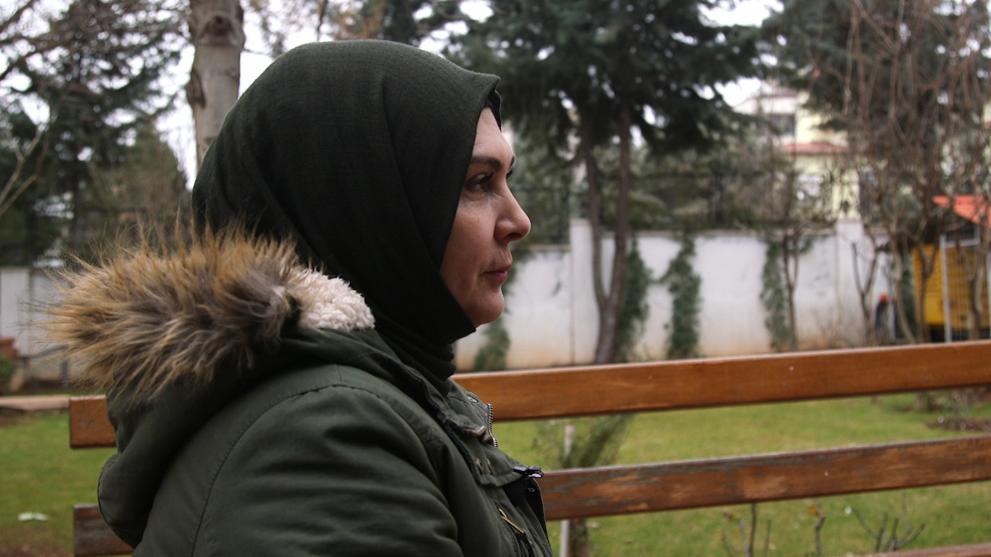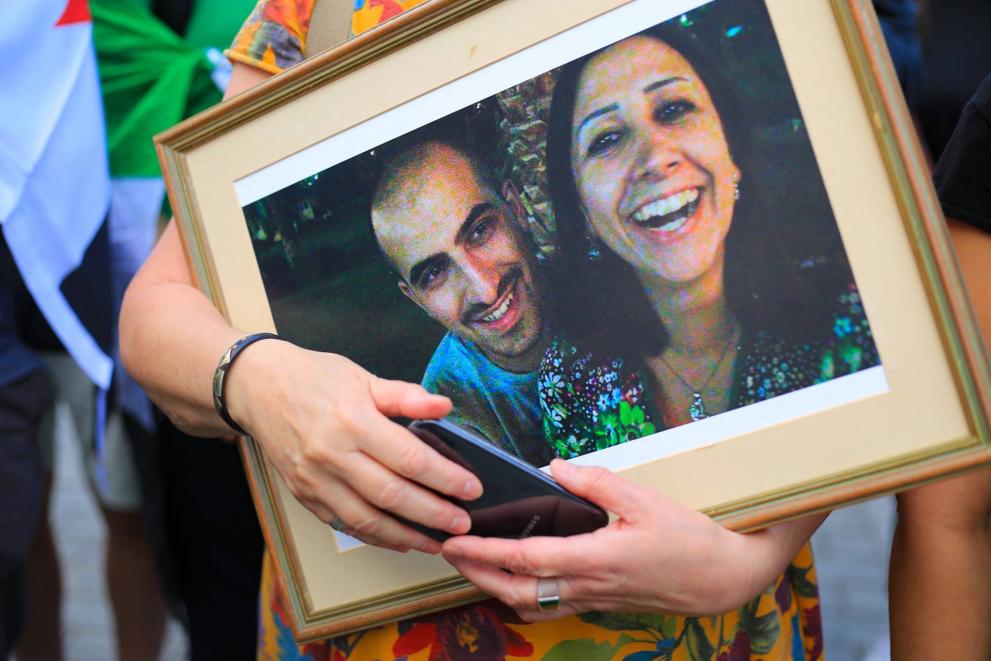"The situation of women has been better during the conflict than before, despite the war… during the peaceful protests in 2011, the voice of women became equal to that of men and the revolution was an opportunity to demand more rights for women", says Ghaliya Al Rahal, a Syrian women's rights activist and director of a network of centres for women empowerment in Northern Syria.
Ghaliya was one of the first women to take part in the demonstrations in 2011 and to call for more rights for women. She quickly understood that Syrian women had a role to play in shaping the future of their country. In 2013, she started with, along with other Syria women, the first centre for women empowerment in the North of Syria. Seven other centres have been established since, three Children Centres in the North of Syria, as well as a magazine on women's issues. The centres seek to support women and empower them politically and economically. They provide vocational training in different areas, first aid training, as well as capacity building to strengthen their role in security, conflict resolution and governance among other areas.
"Most of the women we support, become engaged in supporting other women once they feel empowered themselves", says Ghaliya.

Women driving peace-building efforts
Besides her work with the centres, Ghaliya participates, along with 29 prominent political and civil society representatives from inside and outside Syria, in the Gaziantep Women Platform, an initiative launched in 2018 and supported by the EU to foster cohesion and dialogue between different Syrian actors. It includes representatives of the negotiating team in the UN-led Intra-Syria talks, those working for local councils inside Syria, as well as grass-roots activists like Ghaliya. The Platform allows for gender and women issues to be at the forefront of the political agenda of the negotiations in Syria.
The Gaziantep Women Platform developed a set of concrete recommendations to enhance women participation in the political process and their presence at the negotiating table, on the ground in local structures. The latest initiative in support of the platform was the EU-Canada first joint initiative in Gaziantep in January 2019 with two intensive political and leadership training seminars and one focused on engendering a constitution. Through initiatives like this one, the EU has since the beginning of the crisis supported Syrian women to play a more active role in the political process and in the political life both at national and local levels.
"Women can be the best agent for change: empowering them gives peace a greater chance of success", said EU High Representative for Foreign Affairs and Security Policy and Vice-President of the Commission Federica Mogherini, when she met Syrian and Yemeni women representative of civil society organisations for a High-level dialogue on “Advancing the role of Women in Peace Processes” last December in Brussels.
"The EU has no other agenda than to achieve peace. We will continue to do our outmost to be at the side of the populations and of women in conflict. Once the conflicts are over, our support to empowering women in the peace processes will be transformed into support for their participation in the political processes of their countries”, stressed Mogherini.
High Representative Mogherini has been actively engaging with Syrian women who are seeking to make a difference in public life and to contribute to peacebuilding in their country, twice inviting a group of delegates of the Women's Advisory Board to Brussels to discuss their views of a way forward for Syria.
Women's Advisory Board
The UN Security Council resolution 2254, the road map for a peace process in Syria, refers to an inclusive and Syrian-led political process and it "encourages the meaningful participation of women in the UN facilitated political process for Syria". A mechanism to facilitate the participation of Syrian women and civil society in the intra-Syrian talks has been developed. The Women’s Advisory Board (WAB) is a group of independent civil society representatives who raise matters missing from the agenda, develop policy positions, make recommendations to assist the peace talks, and propose gender-responsive perspectives.
While civil society and women organisations are not formally negotiating parties at this stage of the political process, including women's interest groups is critical to build credibility and legitimacy of any transition. The European Union financially contributes to the functioning of these groups through the European Resources for Mediation Support facility, as well as organising events for the groups to provide advice on policy issues on Syria.
Beyond resilience
Women in war zones are sometimes forced to become the backbone of the suffering society. Women have to take on a variety of roles, from head of the family to resilience actor, peacebuilder or human rights defender. Like many Syrian women, Asmaa is being both the mother and father to her two sons at 27 years old, but she wants to be more than that. She lost her husband, her father and her brother to the war in Syria. She crossed the border while pregnant with her second child.
"I wanted to find a way to do something. I did not want to be passive. I did not want to see people feeling sorry for us", says Asmaa.

In Jordan, she decided to resume her studies for two reasons: she wants to improve the living conditions of her family and offer a better future to her children. But she also wants to help others and repair injustice. Asmaa passed high school exams and received a scholarship to study law.
"I chose to study law because I don't like injustice. I have seen too many horrible things and I couldn't do anything about it. Maybe if I study this subject, I would be able to do something to help people who went through the same things as me."
Like Asmaa, thousands of Syrian girls and women have been able to go to school and university with support from the EU. Improving the education and skills of Syrian women as a way of empowering them and allowing them to have a leading role in society is at the heart of EU support to Syrians. The EU contributes to assisting women in Syria and in the region working to improve their education and the living conditions, advocating for peace and respect for the human rights, including the release of detainees, transitional justice and gender balanced legislation in Syria.
Turning tears into action
Syrian women have paid, and are still paying, a heavy price in this crisis. But despite the loss and suffering, many of them have chosen to act and not resign themselves to their fate. Noura is one of them. She found love while peacefully protesting in the streets of Douma.
"We decided to get married in prison; we did not want to wait. We exchanged vows at the fence with our families. We became known as the bride and groom of the revolution."
As his lawyer, Noura visited Bassel in prison every week for years. But one day Bassel was moved to another prison and Noura was left without any news.

"Through my work on the ground, I realised that nearly all Syrian families have missing people; on all sides. When I came to Lebanon, I realised that I couldn’t stop my activities on the ground and that I needed to stay in touch with the victims of detention, torture and those who disappear and their families", says Noura.
Since her husband went missing, Noura has focused her legal expertise on providing legal and advocacy guidance for the issue of detainees. Along with other women who endured the disappearance of loved ones, Noura founded Families for Freedom, an organisation that helps families of victims of enforced disappearance and arbitrary detention and demands justice and accountability.
“We will continue to demand this in Syria or in Europe wherever we are because we have the right to know the fate of our loved ones and to see them again”, says Fadwa Mahmoud, an activist and co-founder of Families for Freedom, who has survived detention, but lives with haunting questions about the fate of her son and her husband.

Fadwa’s son, Maher, and her husband, Abdulaziz, went missing after being arrested at Damascus International Airport in September 2012. She has not received any information about either of them since then.
Since the detention of her family members, Fadwa has dedicated her life to giving a voice to the families of detainees, insisting on the right to know the whereabouts of her son and thousands of other young men and women who have disappeared in Syria.
Support to International Commission of Missing Persons and Women's Advisory Board
The UN Security Council resolution 2254, the road map for a peace process in Syria, refers to an inclusive and Syrian-led political process and it "encourages the meaningful participation of women in the UN facilitated political process for Syria".
A mechanism to facilitate the participation of Syrian women and civil society in the intra-Syrian talks has been developed. The Women’s Advisory Board (WAB) is a group of independent civil society representatives who raise matters missing from the agenda, develop policy positions, make recommendations to assist the peace talks, and propose gender-responsive perspectives.
While civil society and women organisations are not formally negotiating parties at this stage of the political process, including women's interest groups is critical to build credibility and legitimacy of any transition. The EU financially contributes to the functioning of these groups, as well as organising events for the groups to provide advice on policy issues on Syria.
Through a programme implemented by the International Commission on Missing Persons (ICMP), the EU’s Instrument contributing to Stability and Peace (IcSP) supports families who, like Noura and Fadwa, suffered the disappearance of loved ones. The programme works on increasing the knowledge and skills of these families and better equip them to engage in the process of accounting for their missing relatives; developing a participatory process of data collection among the families and preparing the ground for a future rule-of-law-based effort to account for missing persons and create conditions that will enable people to return to their homes.
